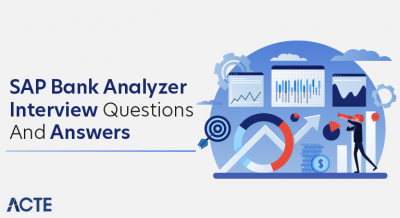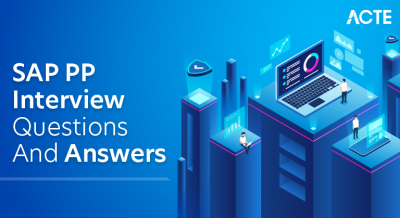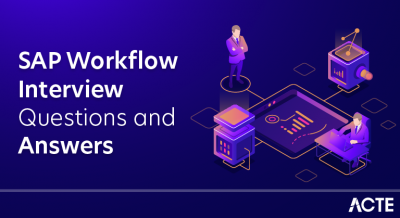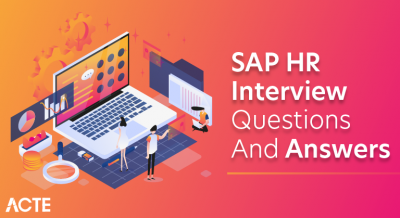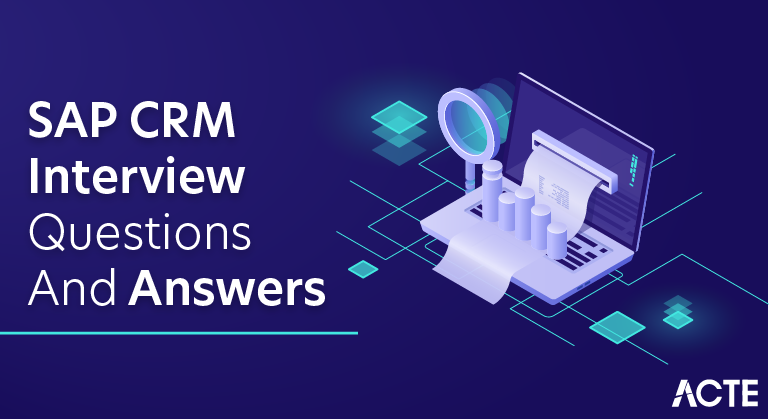
SAP CRM, or customer relationship management, is an integrated solution made to maximize and simplify a business’s customer interactions. Created by SAP, this comprehensive software suite consists of multiple modules covering sales, marketing, and service functions. SAP CRM offers tools for lead and opportunity management, marketing automation, and customer service that help businesses manage customer relationships effectively. By enabling a comprehensive perspective of customer interactions from all angles, it empowers organizations to make well-informed decisions grounded in deep customer insights.
1. What is SAP CRM?
Ans:
SAP CRM, or Customer Relationship Management, is a comprehensive software solution developed by SAP to empower organizations in managing their interactions with customers across various touchpoints. It integrates seamlessly with other SAP modules, offering a unified platform for optimizing customer engagement, sales, marketing, and service processes. By providing a 360-degree view of customer data, SAP CRM facilitates data-driven decision-making and enhances overall customer satisfaction.
2. What are the key modules in SAP CRM?
Ans:
The key modules in SAP CRM encompass Sales, Marketing, Service, Interaction Center, and Web Channel. Each module plays a pivotal role in addressing specific aspects of customer relationship management, contributing to an integrated and efficient approach for organizations to meet their customer-centric objectives.
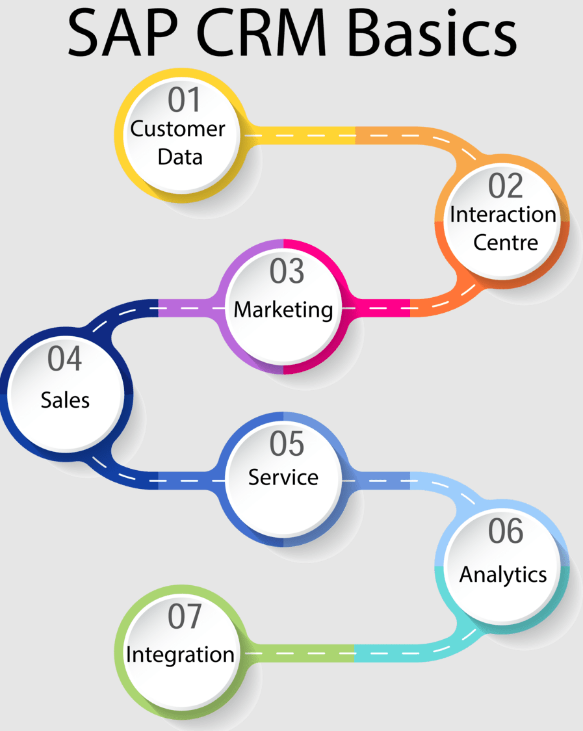
3. How does SAP CRM support sales processes?
Ans:
SAP CRM’s Sales module optimises sales operations by providing tools for managing opportunities, preparing bids, and processing orders. This capability provides real-time information to sales teams, allowing them to make educated decisions and boost productivity in the quest of enhanced sales efficiency.
4. Explain SAP CRM Marketing functionality.
Ans:
SAP CRM Marketing is a robust module designed to empower organizations in planning, executing, and analyzing marketing campaigns. It enables targeted marketing efforts, allowing organizations to tailor campaigns to specific customer segments. This functionality enhances marketing effectiveness by providing insights into campaign performance and customer responses.
5. What is SAP CRM Middleware?
Ans:
- Mediates data exchange
- Ensures consistency across systems
- Supports real-time synchronization
- Acts as a bridge between SAP CRM and other systems
6. How does SAP CRM contribute to marketing campaigns?
Ans:
- Enables targeted campaigns
- Provides analytics for campaign evaluation
- Supports segmentation for precise targeting
- Enhances lead generation
7. What is SAP CRM Web Channel Experience Management?
Ans:
- Enhances online customer interactions
- Enables self-service capabilities
- Facilitates e-commerce activities
- Provides a user-friendly interface
8. What role does SAP CRM play in customer service?
Ans:
SAP CRM’s support module is critical in managing customer support procedures. It has capabilities for processing service requests, managing orders, and resolving complaints. SAP CRM improves customer satisfaction and loyalty by guaranteeing quick and effective replies to customer requests.
9. How does SAP CRM work in conjunction with other SAP modules?
Ans:
SAP CRM connects effectively with other SAP modules, such as ERP (Enterprise Resource Planning), thanks to robust middleware. This connectivity provides data integrity across the organisation, allowing for a uniform and comprehensive view of business processes ranging from consumer interactions to backend operations.
10. What is SAP CRM Web Channel?
Ans:
SAP CRM Web Channel is a specialized component designed to facilitate online sales and customer self-service. This platform provides customers with a user-friendly interface to interact with the organization, contributing to a positive online customer experience. It supports e-commerce activities and enhances the overall digital presence of the organization.
11. Explain SAP CRM Interaction Center.
Ans:
SAP CRM Interaction Center serves as a centralized platform for handling customer interactions. It consolidates inquiries, service requests, and complaints, providing customer service representatives with a unified view. This empowers representatives to deliver prompt and personalized responses, fostering positive customer experiences and relationships.
12. How does SAP CRM contribute to customer loyalty?
Ans:
SAP CRM contributes to customer loyalty by providing organizations with tools to understand and meet customer needs effectively. Through features like customer segmentation, targeted marketing, and personalized services, organizations can create positive experiences, increasing customer satisfaction and fostering long-term loyalty.
13. How does SAP CRM handle customer complaints?
Ans:
- Centralized complaint management
- Tracks complaint resolution status
- Facilitates timely responses
- Improves customer satisfaction
14. What role does SAP CRM play in mobile sales?
Ans:
- Provides mobile applications
- Enables real-time data access
- Supports on-the-go sales activities
- Enhances sales team agility
15. Explain SAP CRM Real-time Analytics.
Ans:
- Provides real-time insights
- Enables data-driven decision-making
- Supports quick response to market trends
- Enhances overall business intelligence
16. What is the significance of SAP CRM Analytics?
Ans:
SAP CRM Analytics is important for organizations because it provides useful insights into customer behavior, preferences, and trends. Businesses can make educated choices, optimize strategy, and constantly enhance customer interaction by employing analytics capabilities inside SAP CRM.
17. How does SAP CRM support mobile access?
Ans:
SAP CRM ensures mobile access through dedicated applications, allowing sales and service professionals to access real-time data and perform tasks on the go. This mobility enhances the agility of field teams, enabling them to stay connected and responsive, ultimately contributing to improved customer interactions.
18. Give the difference between a lead and an opportunity in SAP CRM?
Ans:
| Feature | Opportunity | Lead | |
| Definition | Represents a potential sales deal or business opportunity that a salesperson is actively pursuing. | Represents a potential business opportunity that is not yet qualified or confirmed as a sales deal. | |
| Stage of Sales Process | Typically occurs in the later stages of the sales process, where the potential deal is more concrete and has progressed beyond initial stages. | Initiates the sales process, representing a potential business interest that requires further qualification. | |
| Creation Source | Often created based on the conversion of a qualified lead, indicating a more concrete business potential. | Created as a result of marketing activities, campaigns, or direct contact, indicating initial interest. | |
| Qualification Level | Opportunities are considered more qualified as they have progressed through initial stages of lead qualification. | Leads are in the early stages of qualification, and their potential as a sales deal is yet to be confirmed. | |
| Key Attributes | Includes attributes like sales stage, probability, expected revenue, and competition details. | Contains basic information such as contact details, source, product interest, and status. |
19. Explain SAP CRM Middleware.
Ans:
SAP CRM Middleware acts as a crucial bridge between SAP CRM and other SAP systems, facilitating seamless data exchange and ensuring consistency across the enterprise. This middleware plays a pivotal role in synchronizing data between different systems, maintaining data integrity, and supporting efficient business processes.
20. How does SAP CRM contribute to a personalized customer experience?
Ans:
SAP CRM facilitates a personalized customer experience through its capabilities in customer segmentation, targeted marketing, and service personalization. By leveraging customer data effectively, organizations can tailor their interactions and offerings, creating unique and meaningful experiences that enhance overall customer satisfaction.
21. How does SAP CRM handle customer segmentation?
Ans:
- Supports personalized marketing
- Enhances targeted campaigns
- Enables tailored customer interactions
- Facilitates focused product offerings
- Improves overall customer satisfaction
22. What is SAP CRM Social Media Engagement?
Ans:
- Integrates with social media platforms
- Monitors customer interactions
- Enables proactive engagement
- Facilitates real-time responses
23. What role does SAP CRM play in lead management?
Ans:
SAP CRM plays a central role in lead management by offering tools for lead generation, tracking, and conversion. This functionality streamlines the entire lead management process, providing sales teams with the necessary insights to prioritize leads and increase the likelihood of successful conversions.
24. How does SAP CRM handle customer data privacy and compliance?
Ans:
SAP CRM places a strong emphasis on customer data privacy and compliance by incorporating features that align with data protection regulations. These features ensure the secure handling of customer information, fostering trust and compliance with regulatory requirements.
25. Explain SAP CRM Social Media Integration.
Ans:
SAP CRM Social Media Integration enables organizations to monitor and engage with customers on various social media platforms. This functionality facilitates real-time interactions, allowing organizations to respond promptly to customer inquiries, feedback, and sentiments across social channels.
26. How does SAP CRM contribute to order processing?
Ans:
- Streamlines sales order management
- Automates order creation and fulfillment
- Reduces errors in order processing
- Enhances efficiency in sales operations
27. What is SAP CRM Master Data Governance?
Ans:
- Ensures data consistency
- Maintains accurate customer data
- Supports data governance policies
- Enhances overall master data management
28. Explain SAP CRM Customer Interaction History.
Ans:
- Records all customer interactions
- Provides a comprehensive history
- Enables personalized customer engagement
- Facilitates better customer understanding
29. How does SAP CRM contribute to real-time reporting?
Ans:
SAP CRM contributes to real-time reporting by providing robust tools for generating reports on sales, marketing, and service performance. This capability empowers organizations to make timely and data-driven decisions, fostering agility and responsiveness in a dynamic business environment.
30. What is SAP CRM Master Data Management?
Ans:
SAP CRM Master Data Management ensures the consistency and accuracy of customer data across the organization. This functionality helps avoid data duplicates and discrepancies, providing a reliable foundation for effective customer relationship management and decision-making.
31. How does SAP CRM support multi-channel customer interactions?
Ans:
SAP CRM supports multi-channel customer interactions by allowing organizations to engage with customers through various channels, including online, mobile, phone, and in-person. This versatility ensures a seamless and integrated experience for customers, regardless of the communication channel they choose.
32. Explain SAP CRM Partner Channel Management.
Ans:
SAP CRM Partner Channel Management is a specialized feature that enables organizations to manage relationships with partners, distributors, and resellers effectively. This functionality streamlines collaboration, enhancing the overall efficiency of partner-related processes within the CRM framework.
33. How does SAP CRM address data privacy regulations?
Ans:
- Incorporates data protection features
- Ensures compliance with regulations
- Safeguards customer information
- Supports secure data handling
34. What is SAP CRM Real-time Offer Management?
Ans:
- Presents personalized offers
- Utilizes customer data for relevance
- Enhances real-time marketing efforts
- Increases customer engagement
35. How does SAP CRM support field service operations?
Ans:
- Provides mobile access for field teams
- Enables real-time service data
- Facilitates on-site issue resolution
- Improves field service efficiency
36. How does SAP CRM address the challenges of a global customer base?
Ans:
SAP CRM solves the issues of a worldwide client base by supporting numerous languages, currencies, and regional modifications. This versatility means that organizations can meet the unique demands of clients in different locations, encouraging a globally consistent and customer-centric strategy.
37. What are the main characteristics of SAP CRM Sales Order Management?
Ans:
SAP CRM Sales Order Management automates the end-to-end order processing lifecycle. From order creation to fulfillment, this functionality enhances efficiency and reduces errors, contributing to a streamlined and effective sales order management process.
38. How does SAP CRM handle customer complaints and service requests?
Ans:
SAP CRM provides dedicated tools for tracking and resolving customer complaints and service requests promptly. By centralizing these processes within the CRM framework, organizations can ensure a systematic and timely response to customer inquiries, contributing to enhanced customer satisfaction.
39. How does SAP CRM contribute to customer retention strategies?
Ans:
SAP CRM contributes to customer retention strategies by assisting organizations in identifying and addressing customer needs effectively. Through personalized services, targeted marketing, and proactive engagement, organizations can build stronger relationships with customers, fostering loyalty and retention.
40. What is SAP CRM Web UI, and how does it benefit users?
Ans:
SAP CRM Web UI, or User Interface, is a web-based interface designed to enhance the user experience within the CRM system. This customizable and intuitive interface empowers users with a user-friendly platform for performing CRM tasks, contributing to increased efficiency and user satisfaction.
41. What is SAP CRM Billing Integration?
Ans:
- Integrates billing processes
- Ensures accuracy in billing
- Streamlines invoicing procedures
- Enhances financial transparency
- Improves overall billing efficiency
42. How does SAP CRM facilitate lead nurturing?
Ans:
- Supports lead tracking
- Enables automated lead nurturing
- Provides insights for lead prioritization
- Enhances lead-to-opportunity conversion
43. What role does SAP CRM play in loyalty programs?
Ans:
- Supports loyalty program management
- Tracks customer loyalty metrics
- Enables targeted loyalty incentives
- Enhances customer retention strategies
44. How does SAP CRM assist in pipeline management?
Ans:
SAP CRM aids pipeline management by supplying tools for tracking and managing the sales pipeline. This feature provides insights into possible income sources, allowing businesses to prioritise and optimise sales efforts for better results.
45. Explain SAP CRM Middleware Conflict Resolution.
Ans:
SAP CRM Middleware Conflict Resolution is an important function that handles data conflicts between systems. This capability is critical in safeguarding the integrity of consumer data and facilitating smooth business operations by resolving disputes and guaranteeing data consistency.
46. How does SAP CRM support integration with third-party applications?
Ans:
SAP CRM is important in customer feedback and surveys since it facilitates the collecting and analysis of consumer opinions. Organizations may acquire useful insights, identify areas for development, and constantly improve their goods and services based on consumer feedback using survey tools and feedback systems. This customer-focused strategy helps to overall corporate performance and customer happiness.
47. Explain SAP CRM Real-time Reporting Tools.
Ans:
- Provides real-time reporting capabilities
- Offers customizable reporting templates
- Supports analytics for key metrics
- Enhances decision-making processes.
48. How does SAP CRM handle customer consent management?
Ans:
- Manages customer consent preferences
- Ensures compliance with consent regulations
- Facilitates transparent data usage
- Enhances trust in data handling
49. What role does SAP CRM play in customer feedback and surveys?
Ans:
SAP CRM is important in customer feedback and surveys since it facilitates the collecting and analysis of consumer opinions. Organisations may acquire useful insights, identify areas for development, and constantly improve their goods and services based on consumer feedback using survey tools and feedback systems. This customer-focused strategy helps to overall corporate performance and customer happiness.
50. What is SAP CRM Partner Functionality?
Ans:
SAP CRM Partner Functionality is a feature that enables organizations to manage relationships with external partners efficiently. It allows businesses to collaborate seamlessly with distributors, resellers, and other external entities, streamlining partner interactions and enhancing overall partnership management within the CRM system.
51. What is SAP CRM Integrated Email Marketing?
Ans:
- Integrates with email marketing platforms
- Enables targeted email campaigns
- Tracks email campaign performance
- Facilitates personalized email content
- Enhances overall email marketing effectiveness
52. How does SAP CRM handle warranty management?
Ans:
SAP CRM includes warranty management features, allowing organizations to effectively manage product warranties. It tracks warranty information, automates warranty claim processes, and ensures timely resolution, contributing to improved customer satisfaction and efficient warranty management.
53. Explain SAP CRM Complaint Resolution Workflow.
Ans:
SAP CRM Complaint Resolution Workflow is a structured process that guides organizations in addressing customer complaints. It defines the steps involved in handling complaints, ensuring a systematic and efficient resolution process. This workflow contributes to improved customer relations and satisfaction by providing a standardized approach to complaint resolution.
54. What role does SAP CRM play in customer churn analysis?
Ans:
SAP CRM supports customer churn analysis by providing tools to analyze customer behavior and identify potential churn indicators. By leveraging predictive analytics and customer insights, organizations can proactively implement retention strategies, reducing customer churn and fostering long-term customer relationships.
55. How does SAP CRM handle customer segmentation for targeted marketing?
Ans:
- Utilizes customer data analysis
- Defines segments based on behavior
- Supports personalized marketing campaigns
- Enhances customer engagement
- Facilitates tailored product offerings
56. What is SAP CRM’s role in contact management?
Ans:
- Centralizes contact information
- Enables quick access to contacts
- Supports contact categorization
- Facilitates efficient communication
- Enhances relationship management
57. How does SAP CRM contribute to sales forecasting?
Ans:
SAP CRM aids in sales forecasting by providing real-time data on sales activities, customer interactions, and market trends. This information enables organizations to make accurate predictions about future sales performance, supporting strategic planning and resource allocation for improved sales outcomes.
58. What is SAP CRM Case Management?
Ans:
SAP CRM Case Management is a feature that centralizes the handling of customer issues, requests, and inquiries. It provides a unified platform for managing cases, ensuring that customer service representatives can efficiently address and resolve issues, ultimately contributing to enhanced customer satisfaction.
59. How does SAP CRM handle customer consent preferences?
Ans:
SAP CRM manages client consent choices by offering solutions for capturing and respecting customer data usage preferences. This capability maintains data protection compliance, fosters consumer confidence, and contributes to ethical and transparent customer engagement.
60. Explain SAP CRM’s integration with email communication.
Ans:
- Captures email interactions
- Centralizes communication history
- Supports email tracking
- Facilitates seamless email integration
- Enhances customer communication
61. How does SAP CRM handle sales order processing?
Ans:
- Automates order creation
- Streamlines order fulfillment
- Reduces errors in processing
- Provides real-time order tracking
- Improves overall order management
62. Explain SAP CRM Analytics for Customer Segmentation.
Ans:
SAP CRM Analytics for Customer Segmentation is a tool that enables organizations to analyze customer data and categorize customers into segments based on shared characteristics. This analysis helps businesses tailor marketing strategies, personalize interactions, and optimize services for different customer segments, ultimately enhancing customer satisfaction.
63. How does SAP CRM support service level agreements (SLAs)?
Ans:
SAP CRM supports service level agreements (SLAs) by providing tools to define, monitor, and meet predefined service commitments to customers. This functionality ensures that organizations can uphold agreed-upon service standards, leading to improved customer service and satisfaction.
64. What is SAP CRM Real-time Inventory Management?
Ans:
SAP CRM Real-time Inventory Management is a feature that provides real-time visibility into inventory levels. It allows organizations to track product availability, manage stock efficiently, and ensure timely order fulfillment, contributing to improved customer satisfaction through accurate and timely deliveries.
65. What is SAP CRM’s contribution to customer journey mapping?
Ans:
- Visualizes customer touchpoints
- Tracks customer interactions
- Identifies key customer milestones
- Enhances customer experience design
- Supports targeted interventions
66. How does SAP CRM support customer surveys and feedback?
Ans:
- Integrates survey tools
- Captures customer feedback
- Analyzes survey responses
- Facilitates continuous improvement
- Enhances customer satisfaction
67. How does SAP CRM integrate with e-commerce platforms?
Ans:
SAP CRM integrates with e-commerce platforms through connectors and APIs, facilitating seamless data exchange between CRM and e-commerce systems. This integration ensures consistency in customer data, order information, and other relevant data points, enhancing the overall customer experience across online channels.
68. Explain SAP CRM Billing and Invoicing.
Ans:
SAP CRM Billing and Invoicing streamline the billing process by automating the generation and tracking of invoices. This functionality ensures accuracy in billing, reduces manual errors, and enhances financial transparency, contributing to efficient financial processes and improved customer satisfaction.
69. What is SAP CRM Event Management?
Ans:
SAP CRM Event Management is a feature that helps organizations plan and execute events efficiently. It supports event coordination, attendee management, and post-event analysis.
This functionality contributes to successful event execution and enhances overall customer engagement through well-managed events.
70. What role does SAP CRM play in lead prioritization?
Ans:
- Analyzes lead data
- Defines lead scoring criteria
- Prioritizes high-value leads
- Enhances lead-to-opportunity conversion
- Improves sales focus
71. Explain SAP CRM’s capabilities in customer data governance.
Ans:
- Ensures data consistency
- Maintains data accuracy
- Supports data governance policies
- Reduces data duplicates
- Enhances overall data quality
72. How does SAP CRM handle customer data migration?
Ans:
SAP CRM facilitates customer data migration through data import tools and templates. It ensures a smooth transition of customer data from legacy systems to the CRM platform, maintaining data integrity and consistency. This capability is crucial for organizations adopting SAP CRM to ensure a seamless migration process.
73. Explain SAP CRM Customer Analytics.
Ans:
SAP CRM Customer Analytics entails analyzing customer data to learn about customer behavior, preferences, and trends. Organizations may use analytics tools to make data-driven choices, personalize customer interactions, and improve overall customer satisfaction by gaining a better knowledge of their customers’ demands.
74. How does SAP CRM enable document management?
Ans:
SAP CRM enables document management by providing a centralized repository for storing and retrieving documents related to customer interactions. This functionality streamlines document handling, ensures data accessibility, and enhances collaboration among team members involved in customer-related processes.
75. How does SAP CRM handle service request automation?
Ans:
- Automates service request creation
- Streamlines request processing
- Facilitates efficient case management
- Improves service responsiveness
- Enhances customer satisfaction
76. What is SAP CRM’s role in campaign ROI analysis?
Ans:
- Tracks campaign performance metrics
- Analyzes return on investment (ROI)
- Measures lead generation effectiveness
- Optimizes marketing strategies
- Enhances marketing budget allocation
77. How does SAP CRM support mobile field service operations?
Ans:
- Provides mobile applications
- Enables real-time service data access
- Facilitates on-site issue resolution
- Improves field service efficiency
78. What role does SAP CRM play in trade promotion management?
Ans:
SAP CRM supports trade promotion management by providing tools to plan, execute, and analyze promotional activities. This functionality helps organizations optimize their trade promotion strategies, measure promotional effectiveness, and enhance collaboration with partners for successful promotions.
79. How does SAP CRM handle customer feedback analysis?
Ans:
SAP CRM incorporates tools for customer feedback analysis, allowing organizations to collect, analyze, and derive insights from customer feedback. By understanding customer sentiments and preferences, organizations can make informed decisions, implement improvements, and enhance overall customer satisfaction.
80. Explain SAP CRM Loyalty Program Integration.
Ans:
SAP CRM Loyalty Program Integration enables organizations to seamlessly integrate loyalty programs into the CRM system. This integration ensures that customer participation, points accrual, and redemption activities are accurately tracked, contributing to the successful implementation and management of loyalty programs.
81. What role does SAP CRM play in customer onboarding?
Ans:
- Streamlines onboarding processes
- Captures customer preferences
- Ensures personalized onboarding
- Enhances first-time user experiences
- Facilitates efficient data collection
82. Explain SAP CRM’s features for complaint tracking.
Ans:
- Centralizes complaint records
- Assigns tracking numbers
- Monitors resolution progress
- Ensures timely complaint handling
- Improves customer relations
83. How does SAP CRM contribute to marketing attribution analysis?
Ans:
- Tracks marketing touchpoints
- Analyzes attribution models
- Measures marketing campaign impact
- Optimizes marketing channels
84. What is SAP CRM Social Listening?
Ans:
SAP CRM Social Listening involves monitoring and analyzing social media channels for customer sentiments, mentions, and trends. This functionality allows organizations to stay informed about customer perceptions, address issues proactively, and leverage social insights to enhance overall customer relations.
85. How does SAP CRM facilitate integration with customer support channels?
Ans:
SAP CRM facilitates integration with customer support channels, including email, chat, and phone. This functionality ensures a seamless flow of customer interactions between support channels and the CRM system, enabling efficient case management and resolution.
86. What is SAP CRM Geographical Information System (GIS) Integration?
Ans:
SAP CRM GIS Integration involves incorporating geographical information and mapping capabilities into the CRM system. This integration enables organizations to visualize and analyze customer data spatially, supporting location-based insights for targeted marketing, sales, and service strategies.
87. How does SAP CRM address data quality management?
Ans:
SAP CRM addresses data quality management by providing tools for data cleansing, validation, and enrichment. This functionality ensures the accuracy and consistency of customer data, reducing errors and redundancies for reliable decision-making within the CRM system.
88. What is SAP CRM’s role in real-time inventory visibility?
Ans:
- Provides real-time inventory data
- Tracks product availability
- Supports accurate order fulfillment
- Facilitates efficient inventory management
- Improves overall supply chain operations
89. How does SAP CRM support social media engagement?
Ans:
- Integrates with social platforms
- Monitors customer interactions
- Enables proactive engagement
- Facilitates real-time responses
- Enhances social media presence
90. Explain SAP CRM Cross-Channel Marketing.
Ans:
SAP CRM Cross-Channel Marketing entails coordinating marketing activities across several channels, including online, offline, and mobile. This feature guarantees a consistent and personalised consumer experience across several touchpoints, which contributes to effective and unified marketing campaigns.


